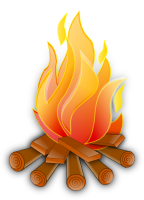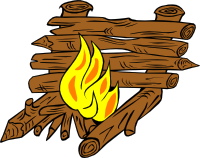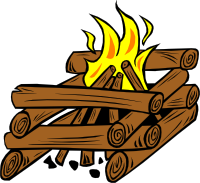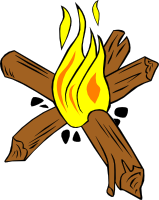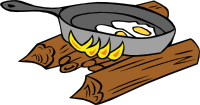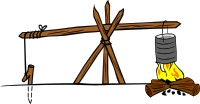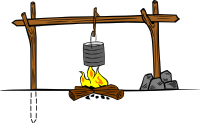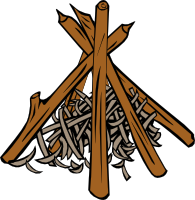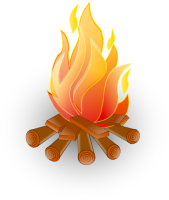Associations to the word «Fire»
Noun
- Volley
- Musket
- Projectile
- Mortar
- Grenade
- Cannon
- Muzzle
- Launcher
- Barrage
- Howitzer
- Gunman
- Kiln
- Boiler
- Gun
- Gunner
- Sniper
- Torpedo
- Caliber
- Bullet
- Pistol
- Canister
- Coal
- Recoil
- Rocket
- Firing
- Carbine
- Artillery
- Rifleman
- Ammunition
- Rifle
- Missile
- Cartridge
- Pounder
- Batterie
- Shotgun
- Flare
- Crossbow
- Smoke
- Gunfire
- Demonstrator
- Gunpowder
- Blaster
- Assailant
- Donetsk
- Furnace
- Militant
- Burst
- Turret
- Bayonet
- Battery
- Catapult
- Attacker
- Gunnery
- Gunboat
- Tripod
- Blast
- Bolt
- Detonation
- Platoon
- Explosion
- Tracer
- Trench
- Rigging
- Barricade
- Oven
- Bombardment
- Redoubt
- Ignition
- Wounded
- Flash
- Firefighter
- Tanker
- Searchlight
- Parapet
Adverb
Pictures for the word «Fire»
Wiktionary
FIRE, noun. (uncountable) A (usually self-sustaining) chemical reaction involving the bonding of oxygen with carbon or other fuel, with the production of heat and the presence of flame or smouldering.
FIRE, noun. (countable) Something that has produced or is capable of producing this chemical reaction, such as a campfire.
FIRE, noun. (countable) The often accidental occurrence of fire in a certain place.
FIRE, noun. (uncountable) (alchemy) (philosophy) The aforementioned chemical reaction of burning, considered a one of the the Classical elements or basic elements of alchemy.
FIRE, noun. (countable) (British) A heater or stove used in place of a real fire (such as an electric fire).
FIRE, noun. (countable) The elements necessary to start a fire.
FIRE, noun. (uncountable) The bullets or other projectiles fired from a gun.
FIRE, noun. Strength of passion, whether love or hate.
FIRE, noun. Liveliness of imagination or fancy; intellectual and moral enthusiasm.
FIRE, noun. Splendour; brilliancy; lustre; hence, a star.
FIRE, noun. (countable) A button (on a joypad, joystick or similar device) usually used to make a video game character fire a weapon.
FIRE, verb. (transitive) To set (something) on fire.
FIRE, verb. (transitive) To heat without setting on fire, as ceramic, metal objects, etc.
FIRE, verb. (transitive) To drive away by setting a fire.
FIRE, verb. (transitive) To terminate the employment contract of (an employee), especially for cause (such as misconduct or poor performance).
FIRE, verb. (transitive) To shoot (a device that launches a projectile or a pulse of stream of something).
FIRE, verb. (intransitive) To shoot a gun, a cannon or a similar weapon.
FIRE, verb. (transitive) (sports) To shoot; to attempt to score a goal.
FIRE, verb. (intransitive) (physiology) To cause an action potential in a cell.
FIRE, verb. (transitive) To forcibly direct (something).
FIRE, verb. (intransitive) (computer sciences, software engineering) To initiate an event (by means of an event handler).
FIRE, verb. To inflame; to irritate, as the passions.
FIRE, verb. To animate; to give life or spirit to.
FIRE, verb. To feed or serve the fire of.
FIRE, verb. To light up as if by fire; to illuminate.
FIRE, verb. (farriery) To cauterize.
FIRE, verb. (intransitive) (dated) To catch fire; to be kindled.
FIRE, verb. (intransitive) (dated) To be irritated or inflamed with passion.
FIRE, noun. The sector of the economy including finance, insurance and real estate businesses.
FIRE AIR, noun. (obsolete) (chemistry) oxygen
FIRE ALARM, noun. An electromechanical or electronic bell, klaxon, chime, horn, speaker, strobe light or other device which warns people in a building of a possible fire or other condition requiring evacuation.
FIRE ALARM, noun. The sound or other warning made by a fire alarm.
FIRE ALARM, noun. (firefighting) An emergency response to a fire by the fire department with manpower and equipment.
FIRE ALARM HORN, noun. A horn on a fire alarm that sounds in case of fire, either automatically when the system detects fire or manually when the alarm is pulled, to alert the occupants of a building or complex of the hazard.
FIRE ALARM HORN, noun. Formerly, a siren used to alert a town or neighborhood of fire.
FIRE ALARM HORNS, noun. Plural of fire alarm horn
FIRE ALARMS, noun. Plural of fire alarm
FIRE AND BRIMSTONE, noun. The traditional punishments of Hell.
FIRE AND BRIMSTONE, adjective. Referencing or emphasizing the power and wrath of God.
FIRE AND FORGET, noun. (military technology) missile guidance system which does not require further control after launch, and can hit its target without the launcher being in line of sight of the target.
FIRE ANT, noun. Any of several red or yellow North American ants, of the genus Solenopsis, that can inflict a harsh sting.
FIRE ANTS, noun. Plural of fire ant
FIRE AWAY, verb. (intransitive) To begin shooting at an enemy.
FIRE AWAY, verb. (intransitive) (figuratively) To begin to talk or present information quickly.
FIRE AX, noun. Alternative form of fire axe
FIRE AXE, noun. A special type of axe used by firefighters, typically featuring a pick-shaped pointed poll (area of the head opposite the cutting edge) and in a vivid color to make it easily visible during an emergency.
FIRE AXES, noun. Plural of fire axe
FIRE BAY, noun. (military) A trench, or section of a trench, with a concealed parapet from which soldiers can fire on the enemy.
FIRE BAYS, noun. Plural of fire bay
FIRE BEATER, noun. A simple tool for fight wildfire, consisting of a piece of rubber at the end of a pole
FIRE BEETLE, noun. A brilliantly luminous beetle, Pyrophorus noctilucus, one of the elaters.
FIRE BEETLES, noun. Plural of fire beetle
FIRE BELLIED TOAD, noun. A small green or brown aquatic toad with orange belly and black spots.
FIRE BLANKET, noun. A large piece of fireproof or fire resistant material, used exclusively to cover and extinguish a small fire.
FIRE BLAST, noun. A disease of plants which causes them to appear as if burnt by fire.
FIRE BLIGHT, noun. A bacterial plant disease, caused by Erwinia amylovora, that affects apples, pears and some other members of the Rosaceae family.
FIRE BLIGHTS, noun. Plural of fire blight
FIRE BLOCK, noun. A wooden block built into the interior of a wall or floor, running perpendicular to stud and joist cavities, especially in balloon-frame construction, intended to inhibit the spread of fire within stud and/or joist cavities.
FIRE BOSS, noun. A person in charge of ascertaining the safety of a mine (excavation).
FIRE BOSSES, noun. Plural of fire boss
FIRE BOX, noun. The hearth of a metal-forging shop; the forge of a smithy.
FIRE BOX, noun. An enclosed hearth with hatch for refueling that is attached to or built into a boiler that supplies steam for mechanical power.
FIRE BOX, noun. The internal hearth of a furnace, stove, or heater.
FIRE BOX, noun. The hearth of an outdoor grill.
FIRE BREAK, noun. Alternative spelling of firebreak
FIRE BREAKS, noun. Plural of fire break
FIRE BREATHING, adjective. Alternative spelling of fire-breathing
FIRE BRICK, noun. Alternative form of firebrick
FIRE BRICK, noun. A bright red colour.
FIRE BRICK, adjective. Of a bright red colour.
FIRE BRICKS, noun. Plural of fire brick
FIRE BRIGADE, noun. (firefighting) (US) A group of people within a corporation or industrial site, organized for the purpose of putting out fires, usually in addition to their normal job.
FIRE BRIGADE, noun. (firefighting) (British) An organization, often part of a local government, whose purpose is preventing and putting out fires.
FIRE BRIGADES, noun. Plural of fire brigade
FIRE BUCKET, noun. (firefighting) a red bucket filled with sand, used to smother fires by pouring sand over them
FIRE BUCKET, noun. (firefighting) a bucket used by a bucket brigade to pass water used to throw onto fires to extinguish them
FIRE BUCKETS, noun. Plural of fire bucket
FIRE BUTTON, noun. (video games) A button on a joystick or joypad that corresponds to the action of firing but often represents other in-game actions.
FIRE BUTTONS, noun. Plural of fire button
FIRE CABINET, noun. (firefighting) a cabinet filled with firefighting equipment
FIRE CABINET, noun. (firefighting) a wall installation where a firehose and tap is located
FIRE CABINET, noun. A laboratory cabinet used to isolate flammable chemicals
FIRE CABINETS, noun. Plural of fire cabinet
FIRE CHIEF, noun. A leader of a fire station; an officer in charge of firemen and fighting fires
FIRE CHIEFS, noun. Plural of fire chief
FIRE CLAY, noun. A type of clay that is able to withstand intense heat; used to make firebricks, crucibles, and other ceramics
FIRE CODE, noun. A set of building and property regulations designed to establish a mandatory standard for a building's ability to resist the start and spread of a fire as well as facilitating the prompt and safe evacuation of the occupants.
FIRE COMPANIES, noun. Plural of fire company
FIRE COMPANY, noun. (firefighting) (US) An organization whose purpose is to extinguish fires.
FIRE COMPANY, noun. (firefighting) (US) A single emergency response unit and its personnel within a fire department
FIRE CROTCH, noun. Alternative spelling of fire-crotch
FIRE CUPPING, noun. A form of traditional medicine in which a cup of heated air is placed against the skin.
FIRE DAMPER, noun. A passive fire protection product used in heating, ventilation, and air conditioning ducts
FIRE DAMPER, noun. A damper which closes off an air duct automatically in the event of fire so as to restrict the passage of fire and smoke
FIRE DAMPER, noun. (historical) (archaic) (mining) a mine worker who detects and clears a mineshaft of firedamp by intentionally burning or blowing it up
FIRE DANCER, noun. A person who incorporates fire into a dance
FIRE DEPARTMENT, noun. (firefighting) (US) An organization, often part of a local government whose purpose is preventing and putting out fires. May provide other emergency services as well.
FIRE DEPARTMENTS, noun. Plural of fire department
FIRE DEVIL, noun. A fire whirl (a whirling column of fire found in large fiery areas such as wildfires, similar in appearance to a dust devil made of fire)
FIRE DEVILS, noun. Plural of fire devil
FIRE DIAMOND, noun. (informal) A coloured diamond symbol identifying the specific risks posed by a hazardous material according to the NFPA 704 classification.
FIRE DIAMONDS, noun. Plural of fire diamond
FIRE DOG, noun. (archaeology) Bronze Age artifact used in worshipping either bulls or the moon, or as a holder for wooden logs to be used in a fire altar.
FIRE DOGS, noun. The metal frame in a fireplace, used to hold the logs, or to support the poker and other tools.
FIRE DOOR, noun. A fireproof door designed to stop fires spreading through buildings.
FIRE DOOR, noun. The door of a furnace offering access to the fire inside.
FIRE DOORS, noun. Plural of fire door
FIRE DRILL, noun. An organised practice to prepare occupants of an office, school or other public building for evacuation in the event of a fire.
FIRE DRILL, noun. (idiomatic) any pointless, unproductive, useless, or chaotic activity (sometimes Chinese fire drill, but this usage is becoming outmoded in an age of political correctness)
FIRE DRILL, noun. (idiomatic) any chaotic, unexpected activity. (With the dropping of Chinese the phrase has also often lost its pejorative meaning of pointless and unproductive. In this way, fire drill is often used in the same idiomatic way putting out fires or fire fighting is used.)
FIRE DRILL, noun. A rod which is rotated on a flat surface like a drill until it is hot enough to start a fire.
FIRE DRILLS, noun. Plural of fire drill
FIRE EATER, noun. Alternative form of fire-eater
FIRE EATERS, noun. Plural of fire eater
FIRE ENGINE, noun. (firefighting) A vehicle used by firefighters to pump water to fight a fire. Typically, a fire engine carries a supply of water and has the ability to connect to an external water supply.
FIRE ENGINE, noun. Any fire apparatus, such as a fire truck or fire engine.
FIRE ENGINE RED, adjective. A bright red colour typically used on fire engines
FIRE ENGINE RED, noun. A bright red colour typically used on fire engines
FIRE ENGINE REDS, noun. Plural of fire engine red
FIRE ENGINES, noun. Plural of fire engine
FIRE ESCAPE, noun. Any of the series of emergency doors, ladders, or stairs used to evacuate a building if a fire breaks out.
FIRE ESCAPE, noun. The entire escape route viewed as a whole.
FIRE ESCAPES, noun. Plural of fire escape
FIRE EXIT, noun. Emergency exit in case of a fire
FIRE EXITS, noun. Plural of fire exit
FIRE EXTINGUISHER, noun. A device that can be used to put out a fire. Usually a cylinder filled with carbon dioxide, dry powder or water, in the latter two cases with some means of pressurising the cylinder to expel the contents.
FIRE EXTINGUISHERS, noun. Plural of fire extinguisher
FIRE FIGHTING, noun. Alternative form of firefighting
FIRE FLAPPER, noun. A fire beater
FIRE FOUNTAIN, noun. (geology) A form of pyroclastic eruption containing magma suspended in gas
FIRE GILDING, noun. A process by which an amalgam of gold is applied to metallic surfaces, the mercury being subsequently volatilized, leaving a film of gold or an amalgam containing from 13 to 16% of mercury.
FIRE GILT, noun. Gold laid on by fire gilding
FIRE GRATE, noun. A grate used to hold the fuel in domestic fireplaces and in many forms of heaters and furnaces.
FIRE GRENADE, noun. (obsolete) (19th century) (firefighting) a glass bulb filled with caustic and often carcinogenic liquid chemicals that when thrown and broken in a fire, smother a fire by removing oxygen
FIRE GRENADE, noun. A thermite grenade
FIRE GRENADE, noun. A white phosphorus grenade
FIRE GRENADE, noun. A firebomb grenade
FIRE GRENADES, noun. Plural of fire grenade
FIRE GUARD, noun. A mesh screen placed in front of a fire to prevent sparks escaping.
FIRE GUARDS, noun. Plural of fire guard
FIRE HALL, noun. (Canada) A fire station.
FIRE HALLS, noun. Plural of fire hall
FIRE HOSE, noun. A hose designed to deliver water to douse a fire, usually much stronger and wider in diameter than a garden hose.
FIRE HOSE, noun. (idiomatic) Any fast, heavy stream (e.g. of information).
FIRE HOSE, noun. (computing) A feed of all updates to a website.
FIRE HOSE, noun. (idiomatic) (colloquial) A human penis.
FIRE HOSES, noun. Plural of fire hose
FIRE HOUSE, noun. (US) (firefighting) Fire station.
FIRE HOUSES, noun. Plural of fire house
FIRE HYDRANT, noun. (firefighting) A device used by firefighters to obtain water from the main supply, consisting of a barrel, connections for hose and a valve assembly.
FIRE HYDRANTS, noun. Plural of fire hydrant
FIRE IN ANGER, verb. (military) To fire a weapon with the intent of causing damage or harm to an opponent (as opposed to a warning shot or a practice shot).
FIRE IN ONE'S BELLY, noun. Alternative form of fire in the belly
FIRE IN THE BELLY, noun. (idiomatic) The emotional stamina and vigor, passion, or inner drive to achieve something, to take action, etc.
FIRE IN THE HOLE, interjection. A warning of an imminent explosion in a confined space, expecially a grenade
FIRE INSPECTION, noun. A examination of a location's risk of having a fire and its supply of equipment to both fight it and to evacuate the occupants.
FIRE IRON, noun. One of a set of metal tools kept beside the fireplace, used to keep the fire burning as required. The set usually consists of fire tongs, a poker, a spade, and a brush for the ashes.
FIRE IRONS, noun. Plural of fire iron
FIRE LOAD, noun. The anticipated amount of wildfire control necessary in a given period and region, based on the number of current fires, the probable number of new fires, and their anticipated intensity.
FIRE LOAD, noun. The quantity of combustible matter in a given area, or the quantity of heat that can be generated by its combustion.
FIRE LOADS, noun. Plural of fire load
FIRE LOOKOUT TOWER, noun. A lookout tower to search for fires in a forest.
FIRE MAIN, noun. A pipe conveying water to extinguish a fire.
FIRE MARBLE, noun. Lumachel
FIRE MARSHAL, noun. (US) A public official with police powers responsible for enforcing fire safety regulations, and sometimes, who also investigates suspicious fires.
FIRE MARSHALS, noun. Plural of fire marshal
FIRE MISSION, noun. (military) A communication between the fire direction center (FDC) and an observer to direct artillery on a target.
FIRE OFF, verb. (transitive) To perform a task rapidly, often unexpectedly.
FIRE ON ALL CYLINDERS, verb. (idiomatic) To operate as effectively as possible.
FIRE OPAL, noun. Any transparent to translucent opal with a warm body colour of yellow, orange, or red.
FIRE OPALS, noun. Plural of fire opal
FIRE OUT, verb. (transitive) to shoot out
FIRE PHILOSOPHERS, noun. (archaic) plural of fire philosopher
FIRE RAFT, noun. A raft laden with combustibles, used for setting fire to an enemy's ships.
FIRE RESISTANT, adjective. Substance or structure capable of withstanding fire, either permanently or for a pre-determined time.
FIRE RETARDANT, noun. Any of several substances used to delay or prevent combustion when used as a coating or component of a combustible material
FIRE RETARDANTS, noun. Plural of fire retardant
FIRE ROLL, noun. A peculiar beat of the drum to summon men to their quarters in case of fire.
FIRE SALAMANDER, noun. A medium-sized black salamander with yellow spots (Salamandra salamandra), native to Europe, related to the tiger salamander.
FIRE SALAMANDERS, noun. Plural of fire salamander
FIRE SALE, noun. A clearance sale at greatly reduced prices, often at losses. Originally, a sale of product that had been damaged by fire or that could no longer be stored because the storage facility had been destroyed by fire necessitating immediate sale or loss of value.
FIRE SALES, noun. Plural of fire sale
FIRE SCREEN, noun. A mesh grill placed in front of a fire to prevent sparks escaping.
FIRE SCREENS, noun. Plural of fire screen
FIRE SERVICE, noun. (countable) fire department
FIRE SERVICE, noun. (firefighting) Service in a fire department or other firefighting organization, whether as a chosen career, or as a result of volunteering or a form of prison labor.
FIRE SHIP, noun. (historical) A wooden ship set afire and then sent floating into an enemy flotilla, with the intent to set the enemy fleet afire too.
FIRE SHIPS, noun. Plural of fire ship
FIRE SIGN, noun. (astrology) Any of the three star signs Aries, Leo or Sagittarius.
FIRE SIGNS, noun. Plural of fire sign
FIRE STAIRS, noun. A fire escape.
FIRE STATION, noun. The building where firefighters and fire trucks / fire engines are housed when not answering an alarm.
FIRE STATIONS, noun. Plural of fire station
FIRE STEP, noun. (military) (chiefly historical) A step or platform dug into the front side of a military trench so that soldiers could stand on it and fire over the parapet.
FIRE STOP, noun. Alternative spelling of firestop
FIRE STORM, noun. Alternative form of firestorm
FIRE SWAB, noun. A water-soaked swab for cooling a gun in action and clearing away particles of powder, etc.
FIRE SWATTER, noun. A fire beater
FIRE TEASER, noun. (UK) (historical) The fireman of a steam engine.
FIRE TEASERS, noun. Plural of fire teaser
FIRE TEMPLE, noun. A Zoroastrian place of worship.
FIRE TEMPLES, noun. Plural of fire temple
FIRE TONGS, noun. Tongs used for gripping and moving burning coals and logs in a fire. Part of a set of fire irons.
FIRE TOWER, noun. A watchtower to search for fires in a forest.
FIRE TOWER, noun. In a high building, a stairway protected by several inches of concrete and entered through a kind of "air lock" that prevents the smoke to enter inside it.
FIRE TOWER STAIRWAY, noun. In a high building, a stairway protected by several inches of concrete and entered through a kind of "air lock" that prevents the smoke to enter inside it.
FIRE TRENCH, noun. (military) A deep trench from which one can fire on the enemy.
FIRE TRENCHES, noun. Plural of fire trench
FIRE TRUCK, noun. (firefighting) A ladder truck, a vehicle used by firefighters to gain access to the upper stories of a building. Typically, a fire truck has a hydraulic system which operates a large, heavy-duty ladder mounted on top of the truck body, space for portable ladders to be stored and compartments for holding other tools that may be needed. Unlike a fire engine, trucks do not have pumps or carry water.
FIRE TRUCK, noun. Any fire apparatus, such as a fire truck or fire engine.
FIRE TRUCKS, noun. Plural of fire truck
FIRE UP, verb. (transitive) To ignite.
FIRE UP, verb. (intransitive) Of an engine or similar, to start.
FIRE UP, verb. (transitive) (computing) (informal) To launch; to run.
FIRE UP, verb. (transitive) To excite; to infuse with energy.
FIRE UP, verb. (intransitive) (dated) To grow irritated or angry.
FIRE WALKER, noun. One who walks over hot coals
FIRE WATCH, noun. In time of war or danger, the task of looking out for signs of fire caused by the dropping of incendiary devices etc.
FIRE WATCH, noun. The act of watching for the occurrence of fires. This is usually done with the intent of detecting fires early so that they can be extinguished quickly and damage to land and/or property can be prevented or minimalized. Fire watches are often employed in forested areas where the risk of fires is high (dry conditions, hot weather, etc) or in industrial settings where hot work (welding, metal grinding, etc) is occurring.
FIRE WHIRL, noun. A whirling column of fire found in large fiery areas such as wildfires
FIRE WHIRLS, noun. Plural of fire whirl
Dictionary definition
FIRE, noun. The event of something burning (often destructive); "they lost everything in the fire".
FIRE, noun. The act of firing weapons or artillery at an enemy; "hold your fire until you can see the whites of their eyes"; "they retreated in the face of withering enemy fire".
FIRE, noun. The process of combustion of inflammable materials producing heat and light and (often) smoke; "fire was one of our ancestors' first discoveries".
FIRE, noun. A fireplace in which a relatively small fire is burning; "they sat by the fire and talked".
FIRE, noun. Once thought to be one of four elements composing the universe (Empedocles).
FIRE, noun. Feelings of great warmth and intensity; "he spoke with great ardor".
FIRE, noun. Fuel that is burning and is used as a means for cooking; "put the kettle on the fire"; "barbecue over an open fire".
FIRE, noun. A severe trial; "he went through fire and damnation".
FIRE, noun. Intense adverse criticism; "Clinton directed his fire at the Republican Party"; "the government has come under attack"; "don't give me any flak".
FIRE, verb. Start firing a weapon.
FIRE, verb. Cause to go off; "fire a gun"; "fire a bullet".
FIRE, verb. Bake in a kiln so as to harden; "fire pottery".
FIRE, verb. Terminate the employment of; discharge from an office or position; "The boss fired his secretary today"; "The company terminated 25% of its workers".
FIRE, verb. Go off or discharge; "The gun fired".
FIRE, verb. Drive out or away by or as if by fire; "The soldiers were fired"; "Surrender fires the cold skepticism".
FIRE, verb. Call forth (emotions, feelings, and responses); "arouse pity"; "raise a smile"; "evoke sympathy".
FIRE, verb. Destroy by fire; "They burned the house and his diaries".
FIRE, verb. Provide with fuel; "Oil fires the furnace".
Wise words
Kind words do not cost much. Yet they accomplish much.

